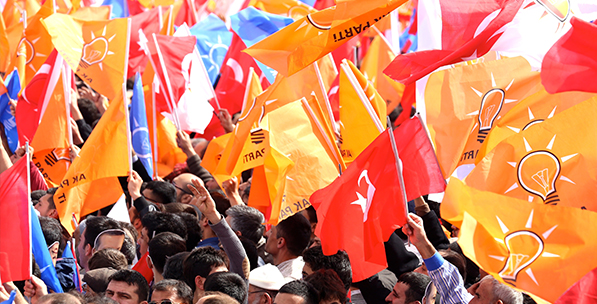The results of the elections held on Nov. 2, 2002, were revealed on Feb. 19, 2001, when a “crisis of the state” emerged between then-Prime Minister Bülent Ecevit and then-President Ahmet Necdet Sezer.
The outcome of the July 22, 2007, elections was already determined on April 27, 2007, when the military issued its e-memorandum. The results of the elections held on June 12, 2011, became clear right after the constitutional referendum held on Sep. 12, 2010. Similarly, the outcome of the upcoming elections of March 30 was already determined by the events of Dec. 17, 2013. In that sense, the last three-and-a-half months, besides having held us captive to the campaign agenda, did not really mean much. Recently conducted polls affirm the above observation. It seems that voter preferences remained exactly where they were at the end of December.
When the race for the March 30 elections began, there were at most 15-17 swing vote cities that were up for grabs. In all but one of these swing cities – in which all the opposition parties were competing against each other – the race was between the AK Party and only one other opposition party.
Therefore, it would be accurate to state that the March 30 race took shape not in a nationwide campaign, but in campaigns in swing cities. Given this simple political landscape, the reasonable strategy for the opposition parties would have been to avoid national political issues to the extent possible, and to focus on local issues of contention. The opposition parties, in what appears to be a mental paralysis, not only failed to determine appropriate campaign topics, but made the spoils of the Dec. 17 operation handed to them by the Gülen group the main message of their campaign.
One thing the race for March 30 showed is that constituents take exception to political manipulations against a legitimately elected government. In fact, any action against legitimately elected governments that lack credulity is perceived as a manipulation of the will of the people. The Dec. 17 operation was a feeble attempt to oust the government by forging a case out of dozens of irrelevant investigations. The forged case would overthrow the government, and a call to hold national as well as local elections on March 30 would be inevitable. Well, one thing spoiled this otherwise perfect plan: PM Recep Tayyip Erdoğan did not back down. On the contrary, he employed extraordinary measures, even at the risk of heavy criticism, and the elected government was able to weather the storm of this coup attempt.
Had the government been overthrown by the police-judiciary coup, Turkey would have been sentenced to a neo-tutelage regime for many years to come. The government, bureaucratic institutions, businessmen, media and various civil groups would have been obliged to surrender to the police-judiciary junta. The breadth of the recent eavesdropping scandal provides enough evidence to justify these claims. It appears that, since 2009, phone lines for more than 1 million people were wiretapped and thousands more were put under surveillance. It is impossible not to discern a pattern of targeting from the list of the eavesdropped. It is also impossible to take those who refuse to acknowledge the gravity of the situation out of spite for Erdoğan seriously. The situation we are facing is truly dismal.
In sum, the outcome of the upcoming elections of March 30 was determined after the events of Dec. 17. So why did we go through the motions of campaigning? Well, it was to ensure the results remained the same. In fact, this column was written a few months ago!









